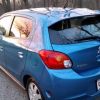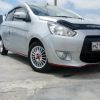
Originally Posted by
Mark

I can't speak for anyone else. The W on oil doesn't stand for weight. The W stands for winter. I am old enough to remember my dad using straight 10W oil during the winter months & straight 30W oil during the summer months. Thinner oil is better for winter and thicker oil is better for summer is forever stuck in my brain I guess.
Personally, I think 0W-20 synthetic oil is a great winter oil. It's super thin! It's also recommended year round in the U.S. for many vehicles now. I cut firewood today. Bar oil is similar to 30W oil. It took forever to pour out of the jug, because it was colder today.
My first experience with 0W-20 synthetic oil is my 2011 Subaru Forester. Thanks to class action lawsuit against Subaru, I basically had a new engine installed @ approximately 90,000 miles. My Forester spent 6-weeks at the dealership this past fall, & I was provided a free loaner (2018 Outback) during this time. I wasn't charge anything, & I didn't buy this Forester from the dealership that did the work. Thus, I am not really complaining here.
An oil consumption test involved the dealership doing an oil change, and you return the vehicle somewhere between 1,200-1,600 miles. I brought it back @ 1,000 miles, because it had already burnt more than a quart of oil. I would have been adding approximately 6 quarts of expensive synthetic oil between oil changes. Why bother changing oil at that rate? Just change filters, right? A Forester requires 5.5 quarts. A 5-quart jug isn't enough to do an oil change by the way. I am somewhat complaining now!
I never had a vehicle (using conventional oils) burn oil at this rate before. I realize this is a design flaw (bad piston rings most likely). Replacing piston rings wasn't fixing the problem, however. Subaru soon discovered that. The entire short block of the engines are being replaced now. When I picked up my Forester 6-weeks later, they had 7 more engines to replace at the time.
This is problem is not just isolated to Subaru. My dad's GMC Terrain (4-cylinder) had its entire engine rebuilt free of charge, too. The Terrain came with a 150,000 mile warranty afterwards. Subaru is not offering that.
I do my own oil changes. I do them ahead of schedule. Subaru dealers suggest 7,500 miles, & I have always done 6,000 miles oil changes with this car. On a positive note, I was never asked to show my maintenance records.
From personal experience, I am still somewhat skeptical of lightweight engine oils being declared awesome! My hope is that my 2017 Mirage will erase that in the next 5-10 years.
One forum member has well over 200,000 miles on his Mirage. It's approaching 250,000 miles. He receives free oil changes every 5,000 miles from the dealership, and it appears they may be using 5W-30 oil. His only problems have been A/C related.
Another forum member claims to use Mobil 1 0W-20 synthetic oil, & his engine is starting to burn oil after 100,000 miles. I take a mental note of these things, because I am still skeptical of lightweight synthetic oil being declared great! I do believe lightweight oil helps in the mpg department, & that is the driving force behind all this.
Sidenote: Subaru Foresters are highly recommended by Consumer Reports. Why is that? Some are burning almost as much oil as a 2 stroke engine.


 GoRf
GoRf Tincan
Tincan

 Reply With Quote
Reply With Quote My Mirage
My Mirage
 Speck
Speck

 Cheap Plastic Car
Cheap Plastic Car
 Ghost
Ghost Onyx
Onyx
 Gray
Gray